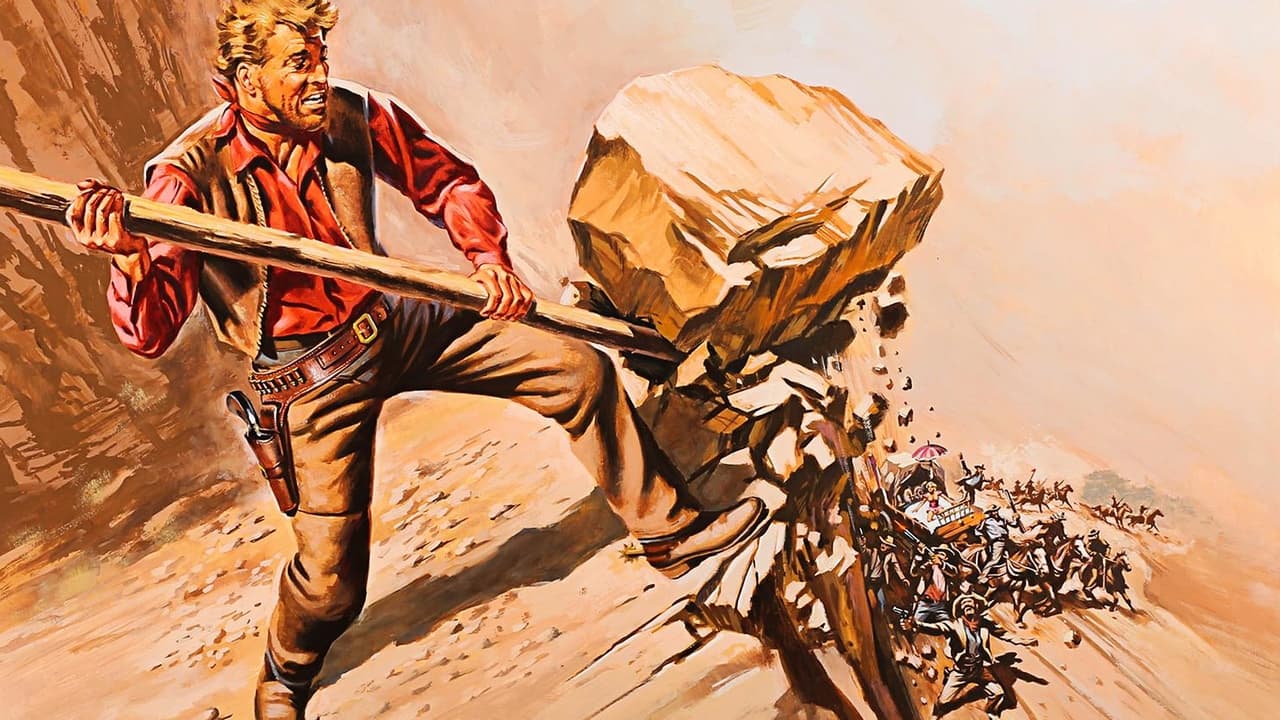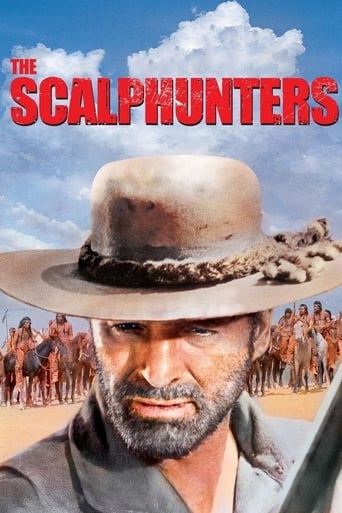Stellead
Don't listen to the Hype. It's awful
Derry Herrera
Not sure how, but this is easily one of the best movies all summer. Multiple levels of funny, never takes itself seriously, super colorful, and creative.
Jemima
It's a movie as timely as it is provocative and amazingly, for much of its running time, it is weirdly funny.
Jerrie
It's a good bad... and worth a popcorn matinée. While it's easy to lament what could have been...
Scott LeBrun
Burt Lancaster offers a robust, fun performance as trapper Joe Bass. One day he's accosted by Indians including the character Two Crows (Armando Silvestre), who force him to turn over his prized furs in exchange for a slave named Joseph (Ossie Davis). Joseph is an articulate and well educated man, but is something of a thorn in Joes' side. Joe is hellbent on reclaiming his furs, going so far as to relentlessly tail the savage outlaws who slaughter the Indians. Jim Howie (an amusing Telly Savalas) is the outlaw leader, Kate (Shelley Winters) his high strung wife.Filmed in glorious widescreen by Duke Callaghan and Richard Moore, the Western comedy "The Scalphunters" was written by William W. Norton and directed by Sydney Pollack. While it purports to treat the character of Joseph with some respect, there may still be viewers who will wince at various indignities that he's forced to experience. Nortons' script is generally engaging, with some witty dialogue here and there. It is a delight to see the distinguished gentleman Davis embrace the more comedic aspects to his character, and there's a lot of entertaining sparring between the two Joes (with Lancaster showing himself to not really be all THAT enlightened). Overall, this film is reasonably exciting at times, even if it's not destined to be a classic.It's the dedicated efforts of a superior cast that make "The Scalphunters" work as well as it does for a somewhat overextended 104 minutes. Lancaster and Davis work well together, and Savalas is also fun to watch as Jim becomes more and more exasperated with this pest that's making life miserable for him and his crew. Winters has some appeal, and there's a few familiar faces among the supporting actors like Dabney Coleman (as Jed), and Lancasters' longtime friend and co-worker Nick Cravat (as Yancy).Dedicated Western watchers and fans of the actors will likely have a decent time with this one.Seven out of 10.
masonfisk
A year before Sydney Pollack hit it big w/"They Shoot Horses Don't They" he made this comic western riffing on the phrase "now you have it, now you don't." Burt Lancaster & Ossie Davis are paired up as the strangest of bedfellows trying to get Lancaster's wares back from a marauding band of scalp hunters led by Telly Savalas & Shelley Winters.Alternately funny & sharply acted, this late 60's entry further pushed the envelope on what Western's were soon becoming.Like the other great American art form jazz, this Western upends many of the stalwart modes we had become used to & plays like an extended riff on a kid's game w/gunfights & a last minute calvary save (in the guise of a pack of Indians) thrown in for good measure.
bkoganbing
The Scalphunters was the first of two films Sydney Pollack directed with Burt Lancaster. In fact according to a recent biography of Lancaster, Burt was literally trying Pollack out on this western before giving him an opportunity to direct the very expensive Castle Keep for him the following year. Personally I think The Scalphunters is a far better film.It's a rollicking good mixture of comedy with some very serious themes involved. It's also the last time Lancaster did any really athletic roles as he was 55 when making The Scalphunters. We all bow to old age at some point.Sydney Pollack actually started his association with Burt Lancaster on the set of The Young Savages where he was an acting coach to some of the street kids who were playing gang members. It was his first introduction into motion pictures, he had previously directed and acted in a number of television productions.Burt is fur trapper Joe Bass who gets an offer from the Kiowa Indians he can't refuse. They'll relieve him of his year's trappings in beaver pelts and he'll get an educated house slave in Ossie Davis. Davis seems born to be a slave, he escapes it from the south, then he's captured by the Comanches who then trade him to the Kiowas and then he's forced on Lancaster. Lancaster is planning to get his pelts back, but a murderous gang of Scalphunters beat him to it and massacre almost the whole band and take Lancaster's furs along with horses and scalps that bring a good bounty. Burt's Joe Bass is not exactly a boy scout, but this crowd truly nauseates him.The Scalphunters are headed by Telly Savalas and his cigar smoking refugee from a bordello of a woman, Shelley Winters. Winters has the best performance in the film, this is her third film with Lancaster with whom she had a self documented fling back in the day. Later on Davis gets captured by The Scalphunters and he has to use his wits to survive among them. But they're going to Mexico where slavery has been abolished.The laughs are mixed in with some serious racial issues all around. Lancaster can't quite accept Davis as an equal, Davis is perfectly willing to go along with The Scalphunters and their genocidal war on the Indians if he'll obtain his freedom through them. And Savalas and his crowd are as mean a bunch as you'll ever see in a film, yet some of the funniest bits in the film involve Winters and Savalas.The Scalphunters is a really funny western that if you think about it teaches some good lessons we could all use.
weezeralfalfa
This unique very entertaining film is, in part, a traditional Western, with several skirmishes involving "Indians", a gang of outlaws, and a lone trapper, who comes to grief from both. In part, it is a slapstickish reluctant buddy comedy involving Burt Lancaster, as trapper Joe Bass, and escaped slave Joseph Lee(Ossie Davis), as well as the often caustic patter between complaining floozy Kate(Shelly Winters) and Jim Howie(Telly Savalas), boss of the fleeing outlaw gang. The trade of Joseph Lee forced upon Bass by the Kiowas in exchange for his year's catch of furs and pack horse serves as a parody on the exchange of desirable lands or other property for much poorer or diminished lands or goods frequently forced on various Native American tribes.Joseph Lee hopes to get across the Mexican border, where slavery is outlawed and blacks welcomed. He's willing to do whatever he has to to accomplish this. Joe Bass's goal is to retrieve his furs and pack horse. At first, Lee plays along with helping Bass retrieve his furs, but when he is captured by an outlaw gang who stole Bass's furs from the Kiowas and who happen to be heading for Mexico, his loyalty between Bass and the outlaws waivers. Both talk down to him at times as if he were intrinsically inferior, and talk about selling him on the slave auction block. Part of the comedy relates to the fact that Lee clearly has(unbelievably) absorbed far more high class white culture from his former owners than either Bass or the outlaws ever will. Remember, this film was released in 1968, the year Martin Luther King was assassinated.Bass nearly recaptures his furs several times, with or without the help of Lee. In addition to his uncanny ability to tract down the location of the offending party and to escape their superior numbers, he surrealistically pushes quite a few 1000 lb boulders down on his enemies, then later poisons a water hole with locoweed to make their horses revert to untamed bucking broncos(an idea he generously gives his horse, Jughead, credit for).In the final showdown between Bass and Howie, Lee has to decide whom to help, with the consideration in his mind of how he might best get to Mexico. After both unsuccessfully attempt to leave the other helpless, Lee and Bass engage in a long slapstickish fight in a muddy water hole, ending in a draw, both covered with gray mud, thus enhancing the impression of equality. But, in a sense, they are both losers, because the Kiowas return. Taking advantage of the distraction of Lee and Bass and the much weakened outlaw gang, Two Crows reclaims the contested furs and pack horse, as well as the now unclaimed Shelly Winters and what's left of the gang's supplies.Some think the film should have ended with Lee successfully escaping both Bass and the outlaws, with Bass's furs and horses to boot, something he nearly accomplished. I can certainly see merit in that view. However, the furs and horses don't rightfully belong to Lee. They rightfully belong to either the Kiowas or to Bass (depending on your viewpoint). Besides, we needed to give Lee an opportunity to show that he can duke it out with Bass, as part of the demonstration that that he is at least as respectable as Bass and the other white men, if not more so. Yes, the parting scene leaves us wondering what became of Bass and Lee, the two main characters, and thus is less than satisfying.Quite a few slaves actually did make it across the Mexican border, often with the aid of Mexicans temporarily or more permanently in Texas. Mexico long refused to cooperate in efforts to recapture these slaves. In 1857, Mexico formally declared any slaves crossing the border to be free. Thus, much of the US army was given the responsibility of reducing this flow(mostly unsuccessfully) and Mexicans were prohibited or much restricted in much of Texas....I should also point out that the Kiowas and Comanches were long term military allies during the 1800s, thus Lee's story about a Kiowa raid on his host Comanches is unlikely, historically.

